
Daily Lenten Devotional
– Vigil Saturday –
 Rest today.
Rest today.
Reflect on the entire Lenten journey. Think of where you have come from since Ash Wednesday. Think of what you have learned. Think of what you have done. See where you have grown.
Prepare. Tomorrow, he rises.
__________________________________________________________
– Good Friday –
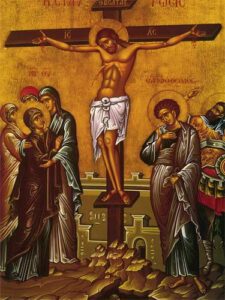 We come to the cross. Sit in its shadow. Pray.
We come to the cross. Sit in its shadow. Pray.
Take it in.
That is all.
– Maundy Thursday –
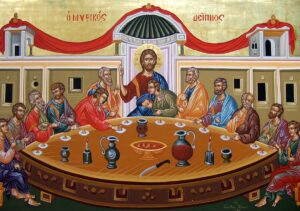 At the table of the Lord, we find the answer to the psalmist’s prayer in Ps. 143. God offers redemption to not only one penitent, but the entire sweep of humanity.
At the table of the Lord, we find the answer to the psalmist’s prayer in Ps. 143. God offers redemption to not only one penitent, but the entire sweep of humanity.
When we come to the table on this sacred night, we join in the wonder of grace. God accepts us at the table. It does not matter who we are, what we have done, or where we have come from, we are included. Note that at the table, ALL the disciples are there, even Judas. Jesus does not withhold the bread or cup from any of them. He knows full well that by morning, none of them will be present. He feeds them anyway.
That is grace.
Nothing more need be said. Ponder this miracle of grace.
__________________________________________________________
– Spy Wednesday –
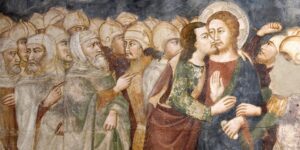 Unlike the psalmist in Ps. 143, Judas seems utterly lost and disconnected from God. No one really knows why he betrayed Jesus—
Unlike the psalmist in Ps. 143, Judas seems utterly lost and disconnected from God. No one really knows why he betrayed Jesus—
St John assumes he was just greedy
The other gospels struggle with his decision, offering no real explanations We are left wondering.
Did Judas want to force Jesus’ hand, making him lead a revolt against Rome? Did Judas feel himself betrayed when Jesus did not reject the extravagant waste of resources when a woman bathed his feet with unimaginably expensive ointments? Did he want to force Jesus to act?
We will never know.
What we do know is that being disconnected from God is devastating. We will blunder about, making all manner of mistake and misstep.
So, watch your step!
___________________________________________________________
– Fig Tuesday –
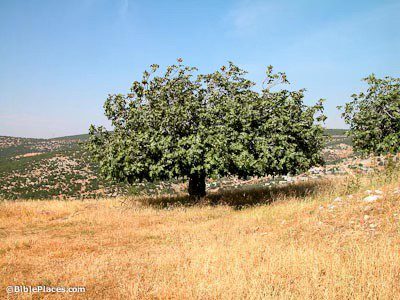 Continuing to follow Ps. 143’s instruction, the next past act of God we remember is Jesus cursing the fig tree.
Continuing to follow Ps. 143’s instruction, the next past act of God we remember is Jesus cursing the fig tree.
On Holy Tuesday we ponder this truly weird episode in Jesus’ ministry. Coming to Jerusalem, he is hungry. He spies a fig tree, but it is nowhere near the season for figs. In a fit of pique, he curses the tree. It dies. The apostles are astonished.
And so are we.
What the heck is this all about?
In one odd sense, it is a reminder that faith has no season. God expects us to be fruitful all the time. There is no moment when we should not be practicing the good. Otherwise, we really aren’t in full communion with God.
Watch and learn.
___________________________________________________________
– Holy Monday –
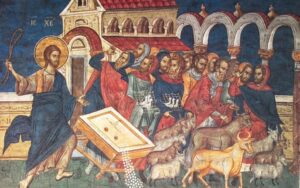 Psalm 143 calls us to recount the past deeds of God to help shore up our faith now.
Psalm 143 calls us to recount the past deeds of God to help shore up our faith now.
On this Monday, the deed we remember is Jesus cleansing the temple. In a remarkable fit of righteous anger, Jesus clears out the temple, driving from the forecourts all the sellers offering the animals and birds for the sacrificial rites; moving on to overturn the tables of the moneychangers who exchanged Roman currency for the official coins of the temple; and finally drove out everybody clogging the sanctuary. In one swift wave of fury, he reduces the temple to its barest function—a place of prayer for God’s people to commune with their Lord.
And that is what faith is really all about—it is not about rite and ritual; it is not about keeping a tally of perfect obedience of all God’s commandments—it is about being with God.
What do you need to clear away to be present for God? What gets in the way of feeling connected to God? Does church help or hinder that walk with God? How? What can be done that is better able to connect us to God?
___________________________________________________________
– Palm Sunday –
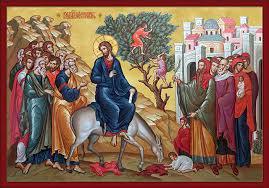 Psalm 143
Psalm 143
Another prayer for help in the midst of an evil world, the psalmist again calls out to God for help, hope, and healing. The psalmist is in dire need, feeling he has descended into an abyss of despair from which he can find no relief. We discover that this is a morning prayer, more than likely after a sleepless night. The psalmist seeks God’s wisdom and counsel for the facing of the day. He prays that God will remain true to God’s own character—that is his only real hope.
When have you felt like you were in a deep hole? What helped draw you out? What offered a glimpse of light in the midst of a dark time?
Think of the crowds along the route Jesus took into Jerusalem. We know they shouted ‘Hosannah!’ which is Hebrew for ‘God save us!’ They are looking to Jesus for help, hope, and healing, all the things this psalm is crying for.
How does the offer of Christ answer that cry?
_________________________________________________________
– Saturday April 12th –
 We have come to the end of the fifth full week of Lent. Use this day to reflect on your progress through the season. We are coming to the end of our Lenten journey.
We have come to the end of the fifth full week of Lent. Use this day to reflect on your progress through the season. We are coming to the end of our Lenten journey.
What have you learned? How have you grown? Has God seemed closer? Do you feel closer to God? What still needs work?
Reread Psalm 130 and see how it helps you formulate your answers to these questions for reflection.
__________________________________________________________
– Friday April 11th –
 Psalm 130 is an individual prayer, but it is an individual prayer rooted in community. The psalmist knows he is part of something bigger than himself. As he experiences grace, he realizes so, too, does the whole community.
Psalm 130 is an individual prayer, but it is an individual prayer rooted in community. The psalmist knows he is part of something bigger than himself. As he experiences grace, he realizes so, too, does the whole community.
In our context, we tend to make most everything about individuals. We talk about personal freedom. We make faith about a one-on-one relationship with Jesus.
That is counter to nearly everything the Bible teaches. For scripture, we are only as good as our community. Jesus’ whole ethic of love was rooted in the inescapable truth that one cannot love by oneself—there always has to be a lover and a beloved. God wants not just each of us, but all of us to be with God.
What can we do to build community? What relationships do we need to strengthen? Where do we need to make amends?
__________________________________________________________
– Thursday April 10th –
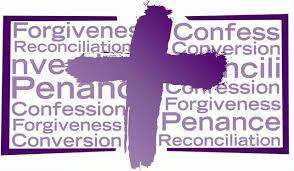 Ps. 130 is grounded in the absolute trust that God holds no grudges. God does not hold onto hurts, offenses, insults, or slights.
Ps. 130 is grounded in the absolute trust that God holds no grudges. God does not hold onto hurts, offenses, insults, or slights.
Thank God! We do enough of that ourselves!
No—the truth of grace is that through confession, we are cleansed. Once admitted, sin can be let go. God erases the slate.
For some, this seems too good to be true. Grace seems to make it seem it doesn’t matter how bad we are, we get a free pass. But that is not how grace works—to find the joy of redemption, we take to heart the cleansing. We start afresh. We work to not repeat mistakes. We change.
In this way, we accept the reconciliation God offers. We tell God we will be different, and then we set about being so. That completes the cycle of grace. It makes us well and whole.
St Paul is the greatest example of this cycle. He was a violent enemy of God, persecuting and killing those who followed Jesus, yet God forgave him, and through grace, Paul became the greatest missionary the world has ever seen. He changed as he was changed by grace.
_________________________________________________________
– Wednesday April 9th –
 One of the main themes of Ps. 130 is that of waiting. There are so many things we wait for— a package to be delivered
One of the main themes of Ps. 130 is that of waiting. There are so many things we wait for— a package to be delivered
a BABY to be delivered
for someone to come home for health
for Christmas to come
…and on goes the list.
The psalmist is waiting for God. Yes, there are times when we find ourselves waiting for God. We want answers to prayers. We want solutions to problems. We want an end to suffering. We wait for God.
In so many ways, that defines faith itself. We wait for God’s resolution of the world, making it what God intended it to be, including us within it. We wait…
God is with us in our waiting. All shall be well, and all manner of thing be well.
_________________________________________________________
– Tuesday April 8th –
 Psalm 130 reminds us that faith is a journey. We walk with God day after day, growing into God, learning about God, and deepening our connection with God.
Psalm 130 reminds us that faith is a journey. We walk with God day after day, growing into God, learning about God, and deepening our connection with God.
Lent is also a journey. We move closer to Easter each day. Along the way, we are to think about what we know, try and discern what we don’t know, and then seek a new understanding of Easter and what it means for us.
Are we ready to accept the gifts of Christ? Are we ready to commit to his way? Do we see the necessity of the cross, not only for him, but for us?
These are all questions to guide our journey.
To help us answer them, we need to join in the confession of this psalm. We need to allow it to lead us into seeking the redeeming grace of God today and each day.
_________________________________________________________
– Monday April 7th –
 Psalm 130 is part of a set of psalms called The Songs of Ascent. They were meant to be prayed and sung by pilgrims making their way to the temple in Jerusalem for the high holy days of Passover, Pentecost, and the Festival of Booths. This psalm is a confession—coming clean before God.
Psalm 130 is part of a set of psalms called The Songs of Ascent. They were meant to be prayed and sung by pilgrims making their way to the temple in Jerusalem for the high holy days of Passover, Pentecost, and the Festival of Booths. This psalm is a confession—coming clean before God.
We all need moments when we come clean. We need to be liberated from the weight and bondage of guilt. We want our spirits to soar freely. Confession is the doorway through which we go to find that release.
Confession opens the door to reconciliation. We admit we have made a mistake. We own that our words or actions hurt someone. We take responsibility. In so doing, we allow another to forgive us, making peace between us.
What might you need to confess to find peace with God? Is there someone you need to apologize to, restoring a relationship?
God is good and grace abounds!
____________________________________________________________
– April 6th, The Fifth Sunday in Lent –
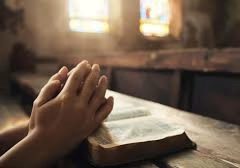 Psalm 130
Psalm 130
This psalm is a prayer of confession—which makes sense if the presumed liturgical use of the psalm is correct—that it was Step 11 as pilgrims made their way up the fifteen temple steps into the sanctuary. Here, the pilgrim acknowledges the necessity of the grace of God.
Stanza 1 is the heart of the confession. The psalmist is lost in the misery of alienation from God, so throws himself on the mercy of God. The psalmist knows that if God were moved solely by retribution, not a person could stand—no one would be holy enough. But God is merciful, which is the actual key to God’s holiness—restorative power, not simply Vindictive power.
Stanza 2 is an assessment of how the psalmist feels. He waits with patience for the restoration and reclamation he prays will come through God’s grace. And he knows his individual experience will be that of the entire community—again we see the complete intertwining of the communal and individual in these psalms.
How have you felt the process of moving from sin into redemption? What let you know it was happening?
____________________________________________________________
– Saturday April 5th –
 We have come to the end of the fourth full week of Lent. Use this day to reflect on your progress through the season. We are about to enter the final push toward Holy Week. We may begin to ponder that now—the Passion of Christ is dawning before us.
We have come to the end of the fourth full week of Lent. Use this day to reflect on your progress through the season. We are about to enter the final push toward Holy Week. We may begin to ponder that now—the Passion of Christ is dawning before us.
What have you learned? How have you grown? Has God seemed closer? Do you feel closer to God? What still needs work?
Reread Psalm 102 and see how it helps you formulate your answers to these questions for reflection.
____________________________________________________________
– Friday April 4th –
 Ps. 102 ends with a resounding assertion that God is eternal. In that eternity is our hope. In that eternity is the promise that there is nothing more powerful than God. In that eternity is our salvation.
Ps. 102 ends with a resounding assertion that God is eternal. In that eternity is our hope. In that eternity is the promise that there is nothing more powerful than God. In that eternity is our salvation.
Think on that…
God is yesterday, today, and tomorrow without end. There will never be a moment when God is not. There will never be a time when God is not there. God is always.
That means we can trust God. We can entrust our lives to God. We can entrust all the people we love to God. We can entrust every situation we face to God’s providence and grace.
Always and forever. Thanks be to God.
____________________________________________________________
– Thursday April 3rd –
 Toward the end of Ps. 102, the psalmist cries out, ‘Do not let me be cut off at midlife!’ He wants more time; he wants more days; and he sees it as utter folly if his life runs out before he is ready.
Toward the end of Ps. 102, the psalmist cries out, ‘Do not let me be cut off at midlife!’ He wants more time; he wants more days; and he sees it as utter folly if his life runs out before he is ready.
Don’t we all want more time? That seems to be a common theme whether we are 12, 40, 70, or 100—we want more time!
The psalmist seems to say that if he dies early, it will be on God’s head. God should know better! What an interesting prayer. It is refreshing to see that here in the Psalms, we can pray all manner of prayer, some that even seem to border on being sacrilegious.
God can handle it. God can handle us.
How is that good news for you today? How does that assurance offer you grace and comfort today?
____________________________________________________________
– Wednesday April 2nd –
 Ps. 102 resounds with a theme that is found all through the Bible—God constantly watches over and seeks out those for whom there seems to be no hope. The psalmist, terrible as his circumstances are, realizes that this situation surely brings him into the awareness of God.
Ps. 102 resounds with a theme that is found all through the Bible—God constantly watches over and seeks out those for whom there seems to be no hope. The psalmist, terrible as his circumstances are, realizes that this situation surely brings him into the awareness of God.
How odd. We celebrate success, power, and ascendancy; but God is always closest to those who feel farthest away from God.
The Bible is also clear that as God is, so should we be.
Jesus made one of the foundation stones of his ministry the compassionate care of the neediest of all. As the community of Jesus, we are called to go and do likewise. In this way, we become part of God’s great communion.
And we bring hope to a needy world, following Christ our Lord.
_____________________________________________________________
– Tuesday April 1st –
 The author of Ps. 102 compares himself to a little bird, lost in the wilderness. It is a touching image.
The author of Ps. 102 compares himself to a little bird, lost in the wilderness. It is a touching image.
To what animal might you compare yourself to today?
When we feel bold and assertive, we tend to think of ourselves as the apex predators of the region—lions, bears, eagles, and so on. But when we feel weak, what animals come to mind? Mice? Ants? The psalmist sees himself in a little bird.
When we feel like this, we can remind ourselves that God is watching the sparrow. Jesus assured his followers that God paid attention to even to birds that cost less than a penny at the market, and so they could know with confidence that God was watching over them.
God is watching over us. Let that hope carry you through the challenges, crises, and conniptions of this day. ‘You are worth far more than a sparrow…’
_____________________________________________________________
– Monday March 31st –
 Feeling out of options is a terribly uncomfortable position to be in, yet it often becomes the one moment when we seek the presence of God. The psalmist in Ps. 102 certainly is desolate. He has lost everything. He turns to God.
Feeling out of options is a terribly uncomfortable position to be in, yet it often becomes the one moment when we seek the presence of God. The psalmist in Ps. 102 certainly is desolate. He has lost everything. He turns to God.
So one immediate question for us all is ‘Why wait? Why wait until all is gone to turn to God?’ God is good and grace abounds all the time—so why do we act as if God is only there when we are out of options?
Perhaps we need to reconsider how we approach God. What can we do to awaken to God’s presence every day? What can we do to remind ourselves that there is no moment when God is not with us?
If we are able to do so, we open ourselves to God’s constant presence, opening ourselves to receiving the blessings and graces of God always.
Try it.
____________________________________________________________
– March 30th, the fourth Sunday in Lent –
Psalm 102
 This psalm comes from the Exile when Jerusalem lay in ruins. But there is a resounding trust that God is still present and active—God remains steadfast and sure despite all else. It begins with an ardent cry for help. The psalmist pleads with God to be present, to hear this lament, and to respond.
This psalm comes from the Exile when Jerusalem lay in ruins. But there is a resounding trust that God is still present and active—God remains steadfast and sure despite all else. It begins with an ardent cry for help. The psalmist pleads with God to be present, to hear this lament, and to respond.
We then hear the explanation—the psalmist exists in utter desolation. He is hungry, broken, and out of options. He feels his life ebbing away. He feels like a tiny bird lost in the wilderness —defenseless and in danger. The predators are the conquerors. They deride the vanquished on a daily basis. The psalmist holds God accountable—God has rejected him and cast him aside like rubbish. He is as fragile as grass.
Then comes a word of assurance. Because the covenant community continues to treasure Zion—i.e., Jerusalem—God will restore them and it to health. The nations will see that God is good and grace abounds. God will redeem the broken and vanquished as God has always done. God will come.
This thought gives the psalmist hope. Sure of God’s redeeming grace, he knows that future generations will look back and note how God saved and restored God’s people. This will be the theme of future worship in Jerusalem—it will be a great celebration of God’s redemption—one that includes all peoples and nations. All will realize they are God’s own.
But there comes a momentary doubt. Right now, the psalmist feels nothing but broken and forsaken. He cannot believe God would cut him down right in the prime of life.
However, God is the creator of heaven and earth. All things created are temporary by nature (seemingly including the psalmist himself). God is eternal. Even if this generation passes, another will rise in worship, for God will keep them and hold them as the resurrected people (cf. one generation was doomed to the Exodus wilderness, but the subsequent one saw and experienced the promised salvation).
____________________________________________________________
– Saturday March 29th –
 We have come to the end of the third full week of Lent. Use this day to reflect on your progress through the season. Celebrate that we are nearly halfway through the season.
We have come to the end of the third full week of Lent. Use this day to reflect on your progress through the season. Celebrate that we are nearly halfway through the season.
What have you learned? How have you grown? Has God seemed closer? Do you feel closer to God? What still needs work?
Reread Psalm 51 and see how it helps you formulate your answers to these questions for reflection.
____________________________________________________________
– Friday March 28th –
 A powerful line in Psalm 51 is, ‘You desire truth in the inward being.’ What do you think that means?
A powerful line in Psalm 51 is, ‘You desire truth in the inward being.’ What do you think that means?
The point seems to be that we remain true to ourselves—not necessarily meaning what we want to be; but rather, what God wants us to be. Are we being true to being the image of God? What needs work to make it so?
Being true also means being faithful—i.e., honoring commitments that make relationships possible. We will say that a treacherous spouse was being ‘untrue.’ We will speak fondly of knowing for sure that our partner is true to us.
In a sense then, this psalm is about true love—true love for God.
How can we be good partners to God? How can we keep from falling to other centers of our lives? How can we keep our love for true and authentic?
____________________________________________________________
– Thursday March 27th –
 One of the stranger pieces of Psalm 51 is the final stanza. There is a prayer to God to restore Jerusalem, and then worship will be what it is meant to be.
One of the stranger pieces of Psalm 51 is the final stanza. There is a prayer to God to restore Jerusalem, and then worship will be what it is meant to be.
That allows us to know this psalm comes from the period of Restoration—sometime around the 5th Century BC. Israel was still recovering from Exile. The temple was not yet rebuilt. The thinking is that once the places for worship are restored, then worship itself will be restored.
For us, it calls us to reflect on the purpose behind the sanctuary of a church. Why is it there? How is it best used? What would happen if it were gone?
We need sacred space and sacred places, not because they are holy in and of themselves, but because they create an environment where we can focus on God. They are to be quiet places of peace. They are meant to shift the focus from ourselves to God.
How does your worship space feel? What about it brings you closer to God?
____________________________________________________________
– Wednesday March 26th –
 Psalm 51 makes clear that God wants a whole lot more from us than a perfectly practiced rite or ritual of worship. In fact, God seems to grow weary of empty worship. Instead, God longs for expressions of the heart.
Psalm 51 makes clear that God wants a whole lot more from us than a perfectly practiced rite or ritual of worship. In fact, God seems to grow weary of empty worship. Instead, God longs for expressions of the heart.
The truth is that unless our hearts are engaged, worship really can become the emptiest hour of our lives. Worship is meant to be communion—the complete engagement of ourselves and God with one another. In order for that to happen, we have to open ourselves to God’s presence. We have to allow the Spirit to enter us.
Rites and rituals are helpful if they create a space for our hearts to open. They become inhibiting when they become an end to themselves.
What can we do to bring more heart into worship? What does true and lasting communion feel like?
____________________________________________________________
– Tuesday March 25th –
 Psalm 51 is not entirely about an individual confession and being forgiven. There comes a moment within the psalm, where the psalmist begins to think of others. He decides to share his experience with someone else.
Psalm 51 is not entirely about an individual confession and being forgiven. There comes a moment within the psalm, where the psalmist begins to think of others. He decides to share his experience with someone else.
That is something that inherent in the Gospel—it is never meant to be something we hoard or keep private. It is meant to be shared. The psalmist, having found the wash of grace through prayer, now chooses to offer the invitation to others to share in that experience.
What keeps us from doing so? Have you ever had an experience of sharing the grace of Jesus with someone else? What did it feel like to do so?
____________________________________________________________
– Monday March 24th –
 Psalm 51 addresses the ‘dirtiness’ of sin. When we carry regret and remorse, we carry a burden of responsibility. We truly feel unclean. We are afraid that if anyone knew us as we actually are, no one would want to be near us.
Psalm 51 addresses the ‘dirtiness’ of sin. When we carry regret and remorse, we carry a burden of responsibility. We truly feel unclean. We are afraid that if anyone knew us as we actually are, no one would want to be near us.
But the psalm does not get stuck there. It moves on.
The key is confession. When the psalmist comes clean about the weight of guilt upon him, he is able to release it. He can allow himself to move on.
Moving on is such a key step in the whole cycle of repentance. Yes, we are who we are; yes, we have made mistakes—some of them grievous; but, yes, also, we can move forward, having been cleansed of our guilt through forgiving grace.
What do you need to be let go of? Whom do you need to tell? Have you prayed over it? What did that feel like?
____________________________________________________________
– The Third Sunday in Lent –
– Psalm 51 –
 This psalm is a model for how to pray in confession, beginning with its utter humility, recognition of what God truly desires from us, and a commitment to sharing the ways of redemption with others.
This psalm is a model for how to pray in confession, beginning with its utter humility, recognition of what God truly desires from us, and a commitment to sharing the ways of redemption with others.
The superscription places it in the story of David, becoming the text of his penitential prayer after Nathan confronted him with his crime against Bathsheba and Uriah. That use informs our own use of this prayer during the season of Lent, a period of prayerful and confessional preparation for the reception of the grace found in the Passion.
The first section is a complete admission of guilt before God. The psalmist is completely dependent on what he hopes are the defining characteristics of God—mercy and compassion. The psalmist makes no bones about his sinfulness before God. He is continually reminded of his inability to live within the confines of God’s law. Therefore, he knows that God is just in condemning him. He knows there has never been a moment when he was without sin, but he knows there is hope for him because he sincerely wishes to be better and to do better. Therefore, he asks God to cleanse him as hyssop is used to cleanse the altar during sacrifice. Then he will be able to rejoice.
The second section builds on the first, beginning with the same thought—‘blot out my iniquities’—as the first.
The psalmist seeks a total transformation of his being. He wants a new heart—a new way of being within the world. That will only come through God’s grace. If God will be merciful to him, then he can be fully restored. If he is restored, he will become a witness to the world of God’s saving grace. He will gladly tell of his redemption to all others in need of it. He will become an instrument of transformation within a world lost in sin. He knows that rite and ritual are only effective if there is such a transformation of being. God wants a change of heart, not empty practice.
The last verses of the psalm are an addition from a post-exilic period. The psalmist wishes to see Jerusalem restored, comparing the city ravaged during the exile to this penitent sinner. If God will lead the restoration of the city and the temple within it, then proper worship will again reign in the covenant community.
How might this psalm inform how you pray in confession?
____________________________________________________________
– Saturday March 22nd –
 We have come to the end of the second full week of Lent. Use this day to reflect on your progress through the season, even in these early days.
We have come to the end of the second full week of Lent. Use this day to reflect on your progress through the season, even in these early days.
What have you learned? How have you grown? Has God seemed closer? Do you feel closer to God? What still needs work?
Reread Psalm 38 and see how it helps you formulate your answers to these questions for reflection.
____________________________________________________________
– Friday March 21st –
 Even in the midst of terrible trouble, Psalm 38 never loses hope that God will be a redeemer. There is a sure trust that God is good and grace abounds even as all else seems to be falling apart.
Even in the midst of terrible trouble, Psalm 38 never loses hope that God will be a redeemer. There is a sure trust that God is good and grace abounds even as all else seems to be falling apart.
What allows us to maintain such hope in trouble?
One quick answer is reminding ourselves of everything that God has said and done, especially as we reflect on the Gospel, calling to mind all that Christ said and did on our behalf. Emil Brunner, a noted 20th Century theologian taught that there are three great works of faith—faith (believing the history of God’s relationship with humanity as true witness to how God works with us); hope (knowing God is already present in the future, making it livable and less harmful); and love (living here and now in the trust of God, allowing us to risk connection and communion). Working through these things is our source of faithful hope here and now.
_________________________________________________________
– Thursday March 20th –
 Psalm 38 is the cry of someone who feels afflicted by God. That is certainly an uncomfortable situation to be in. He really gives us no explanation for how this has come to be, only that it has.
Psalm 38 is the cry of someone who feels afflicted by God. That is certainly an uncomfortable situation to be in. He really gives us no explanation for how this has come to be, only that it has.
That immediately begs the question—have we ever felt the judgment of God upon us? We live in a time and place that rarely if ever speaks of events as being signs of God’s judgment—or if someone does, we regard them as being somewhat loopy. What have we lost in becoming like this?
That is not an excuse to immediately become judgmental ourselves about each other, the world, or anything else. An important point is that no one told the psalmist that God was punishing him; he wondered that all on his own. Only a person suffering has the right to interpret that suffering—remember the folly of Job’s friends!
Still, we need to examine ourselves. Is God correcting us? How does that feel? How might we change?
_________________________________________________________
– Wednesday March 19th –
 Psalm 38 reminds us of the power of community and how much it hurts when we lose connection to our community.
Psalm 38 reminds us of the power of community and how much it hurts when we lose connection to our community.
We were created to live in community. Remember that the only time God declared something not good in creation was when the man stood by himself in the Garden. God never intended for any of us to live in isolation. God made us to connect.
As a community of faith, the church is meant to be present both for those within the church and for those around the church. We are to be a place of connection and communion. We are to be witnesses to the power of being connected with God.
How might we improve our connectionalism? How connected do we seem to be at church? How have you felt the power of community in your life?
_________________________________________________________
– Tuesday March 18th –
 Psalm 38 reminds us that sometimes illness leaves us with nothing to do but think. And sometimes having nothing to do but think is not all that comfortable. Our mind wanders into the darkness. We begin to feel self-pity and ‘woe is me’ wallowing. We don’t really want to stay there, do we?
Psalm 38 reminds us that sometimes illness leaves us with nothing to do but think. And sometimes having nothing to do but think is not all that comfortable. Our mind wanders into the darkness. We begin to feel self-pity and ‘woe is me’ wallowing. We don’t really want to stay there, do we?
Praying through the darkness can really help. First, we remind ourselves that even if no person is present, God is. Knowing the presence of God offers us comfort and hope. We can pray though our illness or trouble, seeking God’s help and healing. Second, giving voice to feelings can help us to let them go. No one really enjoys wallowing. Speaking our discomfort allows us to let it go. Finally, prayer connects us to the light of God, and as St John reminds us as he opens his gospel—the light of God is life—our troubles will pass; things will change.
How does prayer help us when feeling sick? What have you seen when folks pray for someone in difficulty? What might we do to remind ourselves we are not alone in trouble?
_________________________________________________________
– Monday March 17th –
 Something we might try in our prayer life is to pray an acrostic—the form of Psalm 38—simply offer a prayer where each line begins with one of the 26 letters of our alphabet, working through from A to Z. Yes, it may get difficult when you get to X, but it can be done.
Something we might try in our prayer life is to pray an acrostic—the form of Psalm 38—simply offer a prayer where each line begins with one of the 26 letters of our alphabet, working through from A to Z. Yes, it may get difficult when you get to X, but it can be done.
Praying this way slows us down and really makes us think about what we are praying. That can make prayer more effectual and meaningful. Sometimes we fall into praying by rote, offering up phrases we have heard at church or simply praying the Lord’s Prayer because it is all we know. Other times, we fumble around trying to sound profound because we think we need to be artistic as we talk to God. We lose touch with our prayers.
Try this practice and see what it does for you. Does it help your prayers? Do you feel more connected to your prayers? What changed? How did it feel?
_________________________________________________________
March 16th, the Second Sunday of Lent
– Psalm 38 –
 The psalmist feels the physicality of alienation from God. He is literally wasting away. The psalm is composed in such a way that it could be an actual prayer during a time of illness, but, of course, it works metaphorically, as well. To be alienated from God is to be alienated from the One who provides and sustains life, therefore, God’s absence leads to a complete lack of health.
The psalmist feels the physicality of alienation from God. He is literally wasting away. The psalm is composed in such a way that it could be an actual prayer during a time of illness, but, of course, it works metaphorically, as well. To be alienated from God is to be alienated from the One who provides and sustains life, therefore, God’s absence leads to a complete lack of health.
Note also the communal aspect of the prayer. Because of the psalmist’s plight, he is alienated and isolated from the community, too. No one wants to draw near his suffering. If the psalmist indeed suffers from a wasting disease—leprosy, e.g.—he would literally be excommunicated from the community. Isolation feeds despair. The psalmist knows his only hope is in the redeeming grace of God.
The psalm is an acrostic (each line starts with a different letter of the Hebrew alphabet)— therefore, it is a TOTAL confession, exhaustive in its declaration. Note that there is no self- defense or self-justification offered—the psalmist knows he is suffering through his own disobedience to God.
Have you ever felt remorse so deeply that it hurt?
_________________________________________________________
Saturday March 15th…
 We have come to the end of the first full week of Lent. Use this day to reflect on your progress through the season, even in these early days.
We have come to the end of the first full week of Lent. Use this day to reflect on your progress through the season, even in these early days.
What have you learned? How have you grown? Has God seemed closer? Do you feel closer to God? What still needs work?
Reread Psalm 32 and see how it helps you formulate your answers to these questions for reflection.
_________________________________________________________
Friday March 14th…
 Psalm 32 ends with a final word of encouragement—there are two paths before us—one is the way of rebellion, and one is the way of faith. The psalmist is quite clear about the consequences of our choice—to choose the former is a way leading into darkness and a solidification of the alienation and isolation that sin brings; the latter is way to light and a release into joy.
Psalm 32 ends with a final word of encouragement—there are two paths before us—one is the way of rebellion, and one is the way of faith. The psalmist is quite clear about the consequences of our choice—to choose the former is a way leading into darkness and a solidification of the alienation and isolation that sin brings; the latter is way to light and a release into joy.
It makes the choice seem so basic and so clear—why would anyone struggle to make it?
Namely because we all too often fall to SELF—we want what WE want; we want the world to meet OUR needs; and so on and so on…we see why God sometimes sees us as mules!
What can we do to help make the right choice? What can we do to better our chances of aligning with God? How can we stop being so mulish?
_________________________________________________________
Thursday March 13th…
 In Psalm 32:8, the speaker changes, shifting from the one forgiven to the God who forgives. It is a powerful and profound moment.
In Psalm 32:8, the speaker changes, shifting from the one forgiven to the God who forgives. It is a powerful and profound moment.
Note what God says to us— God will teach us
God will offer us the needed wisdom to live well
God warns us not to fall to our stubbornness
God stays near to us, helping us grow from what we are into what God wants us to be. God is generous with instruction, showing us the way to live, the way to be, and how to live. God wants us to succeed.
What a tremendous affirmation!
How do we hear God’s instruction? Where do we hear it? What practices might we begin to open us to God’s wisdom?
_________________________________________________________
Wednesday March 12th…
 In Psalm 32, the psalmist realizes that grace is not a private matter—something to be held onto and hoarded—but rather it is an invitation to generosity. As we are forgiven, we are to share forgiveness with others. We are to invite others into the enfolding grace of God.
In Psalm 32, the psalmist realizes that grace is not a private matter—something to be held onto and hoarded—but rather it is an invitation to generosity. As we are forgiven, we are to share forgiveness with others. We are to invite others into the enfolding grace of God.
We see that move in vv.6 and 7 of the psalm. The psalmist offers a prayer for all who are enduring alienation and isolation from God. He reminds that his experience of grace can be theirs as well.
That is part of our call as a congregation of Jesus—to meet the world, not with condemnation, but with grace. No one can change if they are barred from the door of grace. Jesus practiced a radical hospitality as he met the world around him. He welcomed whomever was before him so they could be more than they were—so they could be reclaimed from sin and death.
How might we actively do so within our churches? How might we be as inviting as Jesus? What might happen to the neighborhood if grace became its foundation?
_________________________________________________________
Tuesday March 11th…
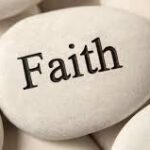 God is good and grace abounds. It is a simple thing to say, and it is a simple thing to affirm about God, but do we ever consider just how great the gift of grace actually is?
God is good and grace abounds. It is a simple thing to say, and it is a simple thing to affirm about God, but do we ever consider just how great the gift of grace actually is?
Psalm 32 reminds us of that depth. God does not hold our sins against us. God does not bear a grudge. How different God is from so many human beings! This does not mean, however, that God does not hold us accountable. Rather, God intends for us to reform as we repent. We cannot keep going the way we were. Change has to come.
Grace is the space in which to make it so. God allows us the space and time to truly make amends. God allows us the space and time to make ourselves new. St Paul called this the process of becoming new creations—we literally make ourselves over again through grace.
So, how would a spiritual makeover feel? What would it take to do so? What might get in the way? What might encourage us to keep at it?
_________________________________________________________
Monday March 10th…
 Psalm 32 opens with a shout of freedom. The psalmist has had a deep experience of being forgiven. His release is palpable. He feels his whole body suddenly singing with soundness. He is feeling oh so good!
Psalm 32 opens with a shout of freedom. The psalmist has had a deep experience of being forgiven. His release is palpable. He feels his whole body suddenly singing with soundness. He is feeling oh so good!
But he acknowledges that he could have felt better sooner if only he had spoken up. Which begs the question—why didn’t he?
Coming clean requires courage. It means becoming vulnerable and being exposed. And, yes, there may be those who immediately pounce with condemnation and ridicule at our failure.
But the psalmist realizes that with God, there is nothing to fear. Correction may come, but it will come with redeeming grace. God practices restorative justice—i.e., it is meant to heal the culprit, not destroy them.
What holds you back from confession? What has it felt like to finally get something off your chest? How might it be to offer such grace to someone else? _________________________________________________________
March 9th… The First Sunday of Lent,
Psalm 32
 This psalm is an expression of the joy at being forgiven. It is a complete release. It is liberating. The weight of guilt is gone. The fear of being discovered is eliminated. The anxiety over rejection is muted. All is well once again.
This psalm is an expression of the joy at being forgiven. It is a complete release. It is liberating. The weight of guilt is gone. The fear of being discovered is eliminated. The anxiety over rejection is muted. All is well once again.
The psalmist sings at the realization that God holds no grudges against him. God has accepted his confession. The psalmist comes to a full understanding that God is good and grace abounds. Nothing could be better to see than to see this light of hope.
The psalmist then calls others to let go of their fear of reprisal and make confession, too. He realizes that God’s grace is an overabundance. There is more than enough to go around. The psalmist wonders why anyone would hesitate to make their confession.
Do we ever see confession as a gate to joy? What keeps us from seeing that truth? When have you felt the liberation of forgiveness? How does this insight change the way we might view repenting?
_____________________________________________
Saturday March 8th…
 Psalm 6 ends with a great affirmation that God has indeed heard and interceded on behalf of the psalmist. Dawn is breaking. The night of suffering is coming to an end.
Psalm 6 ends with a great affirmation that God has indeed heard and interceded on behalf of the psalmist. Dawn is breaking. The night of suffering is coming to an end.
Without saying it directly, the psalm reminds us that darkness passes. Nothing in all creation lasts forever. Only God is eternal. When we pass through a time of suffering, it can feel endless. But hope can come as we assure ourselves that this moment of pain is fleeting. It cannot last forever.
However, it is also true that we sometimes have a hard time believing that.
What helped the psalmist was the experience that he had been heard. God heard his cries for help. God heard his suffering. Being heard was the first step in healing.
Why is being heard so powerful? What comfort comes in knowing someone actually heard what we were saying? How do you know that God has listened to you?
___________________________________________________________
Friday March 7th…
 Many scholars believe Psalm 6 reflects the experience of illness. Being ill is never pleasant. There is the deep awareness of feeling weak. There is the listlessness of no energy. Our bodies can literally ache with being unwell. We long for being well. It can seem so endless.
Many scholars believe Psalm 6 reflects the experience of illness. Being ill is never pleasant. There is the deep awareness of feeling weak. There is the listlessness of no energy. Our bodies can literally ache with being unwell. We long for being well. It can seem so endless.
It is interesting that if this psalm is indeed a prayer from a time of sickness, the psalmist personifies illness, casting it as an enemy or even a host of enemies. Sickness can be an enemy. It keeps us from doing what we want to do. It robs us of being able to engage in the things we like to do. It separates us from the people around us—no one wants to be with a sick person.
The psalmist looks for an almighty ally in the face of illness, turning to God in prayer.
How does prayer help in a time of illness? How does knowing others are praying for you in an illness make a difference? Have you ever had an experience of God’s healing in a moment of illness?
_________________________________________________________
Thursday March 6th…
 Psalm 6 gives voice to anxiety. Anxiety is worrying about what MIGHT happen, not what actually is happening, or has happened. It is a fear of potentials. We project out what outcomes might come about, trying to steel ourselves to be ready for whatever comes. Unfortunately, when we are truly anxious, we tend not to see any good outcomes, but trend toward worst- case scenarios.
Psalm 6 gives voice to anxiety. Anxiety is worrying about what MIGHT happen, not what actually is happening, or has happened. It is a fear of potentials. We project out what outcomes might come about, trying to steel ourselves to be ready for whatever comes. Unfortunately, when we are truly anxious, we tend not to see any good outcomes, but trend toward worst- case scenarios.
Anxiety often comes because we feel guilty about something. We have said or done something we deeply regret. We are fearful that someone might find out our secret. In the worst anxieties, we can begin to feel paranoid, doubting even our loved ones and friends of their sincerity. Anxiety can be a vicious state to be in.
The psalmist looks to God for release, praying that as he reveals himself to God, God will free him.
What makes you anxious? How do you let go of ‘what ifs’ so you can live in what is? How does prayer become an avenue to escaping anxiety?
__________________________________________________
ASH WEDNESDAY
March 5th
 Psalm 6 is an evening psalm offered by someone enduring the ordeal of a sleepless night. Tormented, the psalmist cannot find rest. Instead, he feels only anguished suffering. Some scholars think this psalm reflects the experience of being gravely ill. In the dark of night, one doubts that one can survive—all we can feel is being sick.
Psalm 6 is an evening psalm offered by someone enduring the ordeal of a sleepless night. Tormented, the psalmist cannot find rest. Instead, he feels only anguished suffering. Some scholars think this psalm reflects the experience of being gravely ill. In the dark of night, one doubts that one can survive—all we can feel is being sick.
But not all illnesses are physical. Worry can keep us awake. Fear can keep us awake. A bad argument can keep us awake. A deep sorrow can keep us awake. In the middle of the night, all these feelings can feel so overwhelming.
Yet the psalmist knows that God is near, and so prays for God meet him in the steadfast love that flows from God. It is the middle of the night, but dawn is coming.
Think of your last sleepless night—what helped? Was there prayer? What did it feel like? Was God there?
__________________________________________________
LENTEN DEVOTIONAL: THE PENITENTIAL PSALMS
March 4th
Within the Psalter, there are seven Psalms called the Penitential Psalms. They are Psalms 6, 32, 38, 51, 102, 130, and 143. These prayers of confession address a multitude of ways we have fallen away from God, as well as the subsequent need for restoration through repentance, cleansing, and forgiveness. They are meant to be a tool through which we can fully receive and accept the redeeming grace of God.
One can see why they are so appropriate for the Season of Lent. Lent is a time of preparation as we ready ourselves to celebrate the ultimate act of redemption—the Passion of Christ followed by his Resurrection on Easter morning. It is a season when we can come clean before God, admitting freely the ways we have not lived as God would have us to live; readily admitting the areas in our life that need work; and readily admitting that we cannot achieve these goals on our own, but how much we need God’s presence to do so.
The object is not to tear ourselves to pieces and denigrate who and what we are, but instead to celebrate that God always and forever sees the potential for goodness within us and will not abandon us. God wants us with him in complete communion. These psalms become a way for us to pray ourselves into the presence of God, receiving this wonderful gift of grace.
This year’s Lenten Devotional is designed to aid that process. We will focus on one of the psalms Ash Wednesday and each subsequent Sunday of Lent through Palm Sunday, working through the set of seven. We will use the days to contemplate what the psalm is teaching us, how it offers us a prayer practice for the week, and how we might take in the lesson to reorder our lives to align with the grace God offers.
This promises to be a rich experience for all of us.